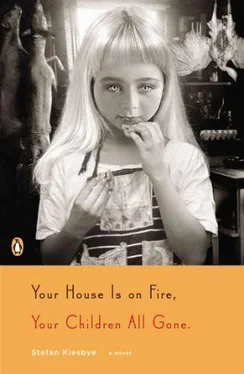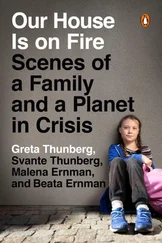The night after the funeral, when I stop by the inn for a glass of beer, Hilde, Alex’s wife, is behind the bar and nods at me. She is plump and her hair is cut short and dyed a shade of red, with blond highlights running through it. Hardly anyone remembers that she was once married to Alex’s brother, Olaf. Hilde’s second marriage has not produced any children, and Alex worries about the future. He complains about heartburn. Who will inherit the inn and the new hotel and riding stables?
Autographed photos of regional celebrities hang behind the bar. They are made out to Alex, praising his food and his liquor. A singer in a white suit and with curly hair, who once crooned about warm nights in Naples and the starry skies above Capri, smiles down at me; a newscaster looks serious in black and white, and the mayor of Bremen watches me from behind his dark glasses and bares his teeth.
Yet Martin has spurned Alex’s invitation and hasn’t come. From time to time, Alex buys pricey oil paintings from his school friend, pictures of local landscapes with threatening clouds and blooming moorlands. In them the skies take up nearly the whole canvas and maim houses and farms. Alex claims that Martin’s store wouldn’t survive without his patronage. He’s told me that he’ll take care of his friend’s family should something tragic happen to Martin. He has created trust funds for Martin and Veronika’s children, but he has never spoken to them. Martin makes sure that Alex sees them only from afar.
Linde has not come to Frick’s Inn either. Maybe she has found peace; maybe she’s finally even with Anke. Or maybe she’s still waiting for her scholarship, still waiting for the black Mercedes to slowly drive into the village and pull up in front of her ramshackle house, and for Anke to get out of the car, open the gate to the garden, and knock on the door. But maybe she hates Alex even more and can’t forgive him for what he once did to her hated friend.
I look around and overhear a young man talk with contempt about the legends of giants and wizards. “What a dreadful landscape,” he says to his female companion. He has pushed his sunglasses up into his hair, even though it’s dark outside and pouring relentlessly. “It’s flat, swampy, and always gray. And look at the people.” He doesn’t lower his voice as he continues his tirade. “Incest. Narrow shoulders, wide hips, and large feet. Everybody is everybody else’s cousin. And they still believe in ghosts.”
“I’ve seen the will-o’-the-wisps with my own eyes.” I should keep my mouth shut, but the funeral feels like a giant rock in my stomach. One fight is as good as the next.
The young man turns around to face me. “Really?” he says and laughs tauntingly. “How much have you had to drink, old man?”
I glare at him, and the girl at his side talks to him in a whisper. I lift my glass and say, “Sometimes you can still see them today.”
The young man laughs too loudly. “Boo,” he says. “How terrifying.”
Yet at that moment Alex appears behind the bar. “Shut up,” he bellows at the young man. “If you don’t like it here, then piss off.”
Then he takes a construction blueprint from behind the bar and spreads it in front of me. “I’ll tear down the old stables, build better and bigger ones.” He points with a thick finger to a point on the paper. “The house is rotted through. The rats have pissed and shit on every floor and every beam. But the foundation is still solid. We’ll rebuild the house just as it was. I retrieved the old blueprints. Outside everything will look like in the old days, only on the inside we’ll modernize. Everything will be top notch. Twenty hotel rooms, all of them with a good-sized bath, a few with Jacuzzis. The rooms will be made to feel authentic. All the materials will be first class.” He continues talking this way, but he suddenly seems to have lost interest. He casts down his gaze, then looks at me questioningly. “That Linde—she’s one crazy old hag, isn’t she? ‘You killed her.’” He rubs his cheek—he’s still feeling her hand slap him. His eyes are waiting for an answer, and I don’t provide him with one. “Well,” he says and grunts. “It wasn’t my fault the two of them didn’t get along.” He looks as though he’s been badly wronged. “It’s the truth.”
Hilde joins us later. She will run the hotel, she says. Alex will have to look for someone new to help out at the inn. “Not too young, not too plump,” she adds with a smile, and strokes her husband’s cheek. Her lips open in a kiss. Alex puts his arm around her shoulder. “She worries about my heart,” he says. “When God takes away our ability, why doesn’t he also take our desire with it?” His teeth are full of gold.
———
Time is of no importance. Despite the rain, I don’t walk straight home. Only at night, when the noise of the cars abates and the streets are empty and I walk out onto the moor, can I be alone with the old pictures I carry in my head. Then I can spread my memories out over Hemmersmoor and find my way around. Far away from the village square and the smells that pour out of Frick’s modernized kitchen, the scent of peat still hangs in the air. After dark the witches still gather on the moor. Heidrun Brodersen still struts through our streets. At night lovers meet by the canals.
Not far from the village I run into a dark figure. My first impulse is to turn off the path, but after a moment’s time, I stand and wait; not too many people seek out the peat bog during a downpour.
Linde is wearing a long coat over her dress; her hair is wet and plastered to her head. “Christian,” she says. “Still awake too?”
“What are you doing here?” I ask. “Why didn’t you come to Frick’s?”
“Do you have a cigarette?”
I offer her one but manage only after several tries to light it. Wind and rain extinguish the lighter again and again.
“I’ll leave Hemmersmoor,” she says suddenly, and nods several times.
“Yes,” I say.
“Each and every day I walk our streets. Every day I see the same people, the same houses. But I never left. It’s been like a curse—I couldn’t leave.”
I nod my head.
Linde takes a long drag and says, “I hope Alex gets his due and dies.”
I nod again and light a cigarette for myself. “He looks pretty healthy to me.”
She laughs. “Did he show you his blueprints and maps? Did you drink with him?”
“Of course,” I say.
“You never had a soul.” She says it without anger; she doesn’t care about me. “You were always a ghost.”
I nod once more. I say, “A spirit.”
“You’ll see. Alex will bite the dust before me.”
“Sure,” I say, but my answer isn’t good enough for her and she turns away and leaves. She’s a good friend. In her own way she’s still loyal to Anke Hoffmann, as though the two were still wearing the same rolled-up braids. She’s never forgiven Anke; that she owed to her friend. Her hatred bound them together, and now that Anke has died, Linde only keeps on living in her hatred for Alex. What use does she have for a new house in a new town?
What about myself? I don’t have anything to forget or forgive. Nobody has ever loved me enough to hate me beyond my grave. My wife is dead, and she never knew me, couldn’t see the boy from Hemmersmoor. She did away with my past like discarding a worn coat.
The chest of drawers stands in the same spot it did when I was young, and I’ve gathered all the old photographs. The baker Meier and my dad smile at me. They have faded, turned gray; they almost look harmless. Two young men who have just started their lives. But the dead are restless spirits—they meddle with everything. I’m a light sleeper, and they sense that and invade my dreams. This is very easy for them. I can swat at them as though they were fleas or cockroaches, but I can’t get rid of them. My mother and sister keep me company and lament their fate, my housekeeping, and the state of my wardrobe. The Gendarm visits me, and the von Kamphoffs stop by as well. With Alex’s help, their house will rise again on the hill Hüklüt the Giant left behind. All visitors gather in my living room, make themselves comfortable on the sofa and the carpet in front of the fireplace. I despise them, but if they should ever turn their backs on me, what will I have left? I was raised in this village. I can’t replace them.
Читать дальше












